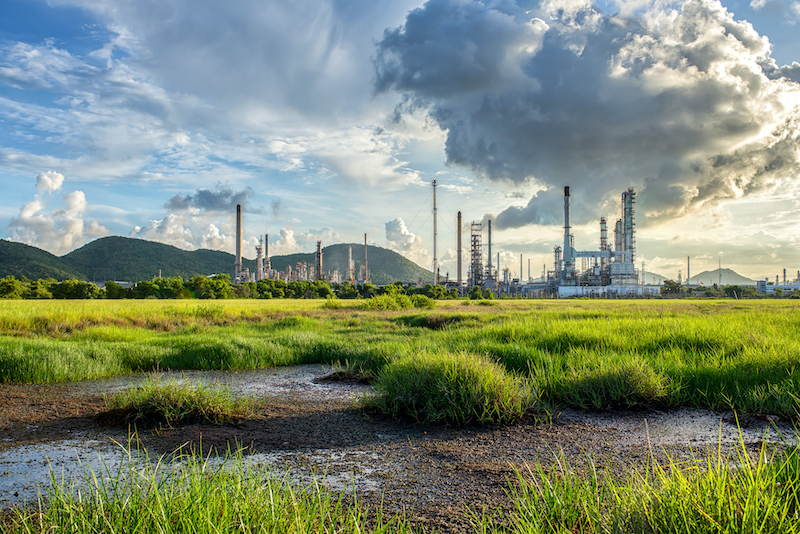EU to Launch First Phase of World-First CO2 Border Tax
(Reuters) — The European Union starts the initial phase of its plan for the world's first carbon border tax next month, requiring importers to report the CO2 emissions of products sold into Europe, such as steel and cement, or risk financial penalties.
The aim of the new regime is to prevent domestic EU industries from being undercut by more-polluting foreign competitors, while they invest in reducing emissions.
Once it is fully in force from 2026, imports into the EU will pay a CO2 fee equal to what European companies already pay in Europe's carbon market.
Turkey, Ukraine, China and Russia are expected to have the biggest volumes of exports affected by the CO2 tax — although EU trade with Russia has plunged since the Ukraine conflict.
Industries in Europe, Ukraine and Britain said they expected little initial impact, but warned of potentially significant fallout when the full CO2 levy launches in 2026.
From October, the CO2 levy's trial phase will require companies importing steel, cement, aluminum, electricity, fertilizers and hydrogen into the EU to report the emissions involved in producing those goods.
Companies will face penalties of up to 50 euros per tonne of CO2 if they don't report. From 2026, there will be a CO2 fee applied to goods brought into the EU.
A UK Steel spokesperson said it is not expecting a significant impact in the initial reporting phase.
A spokesperson for ArcelorMittal Kryvyi Rih, steelmaker ArcelorMittal's Ukraine subsidiary, said it had "almost all" the data ready to comply.
"However, questions arise regarding the cost of this adaptation and the competitiveness of Ukrainian products in 2026," the spokesperson said, citing companies' limited ability to invest in decarbonization during wartime.
The border fee won't apply to imports from countries with a CO2 price equal to the EU's. That could benefit Ukraine, which is aligning its climate policies with the EU's, as it bids to join the bloc.
The EU levy also allows exemptions for countries facing unprovoked situations that destroy infrastructure.
"It will be assessed in due time whether this clause can effectively address the exceptional situation of Ukraine," a European Commission official said.
Equal Costs
Brussels hopes the border levy can leverage Europe's market power to nudge foreign companies to reduce emissions to avoid the CO2 fee.
Foreign companies — and governments including China — have warned of other consequences.
The China Iron and Steel Association's Secretary General Jiang Wei said the policy could raise the price of Chinese steel exports to the EU by 4-6%, state media reported this month.
The Association did not respond to Reuters' request for comment.
In a WeChat post on August 31, Chinese steelmaker Baowu Steel Group described the EU levy as a "huge challenge".
"Ninety percent of steel is produced from the blast-furnace and basic oxygen furnace-based process, which is capital intensive and requires enormous investment and time for technological modification," the company said.
Importers can initially use default values to calculate the CO2 footprint of goods if suppliers don't provide precise data. The first reports are due in January.
European industries have urged Brussels to ensure this leniency is only temporary.
If it does not use real emissions data, the levy will fail to penalize the most carbon-intensive power generators, said industry association Eurelectric adviser Ioana Petcu.
"The transitional phase needs to be used to close loopholes and establish more robust rules to tackle circumvention," steel lobby Eurofer's Deputy Director General Adolfo Aiello said.
Concerns about circumvention are likely to increase as the levy's full launch in 2026 gets closer, and Brussels starts phasing out the free CO2 permits it currently gives European companies to reduce their carbon bill.
Related News
Related News

- Keystone Oil Pipeline Resumes Operations After Temporary Shutdown
- Freeport LNG Plant Runs Near Zero Consumption for Fifth Day
- Biden Administration Buys Oil for Emergency Reserve Above Target Price
- Mexico Seizes Air Liquide's Hydrogen Plant at Pemex Refinery
- Enbridge to Invest $500 Million in Pipeline Assets, Including Expansion of 850-Mile Gray Oak Pipeline





Comments